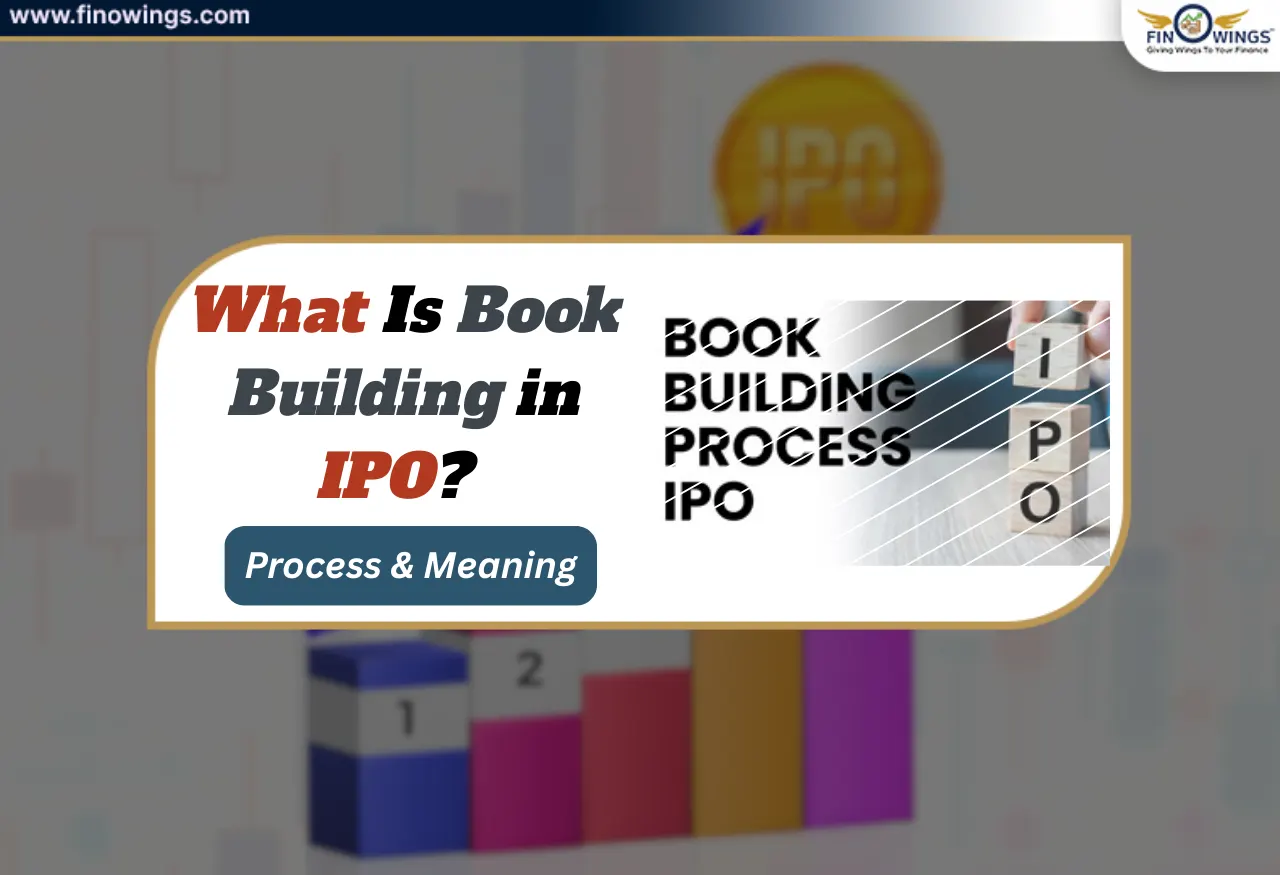Home >> Blog >> What Is Book Building in IPO? Process & Meaning
What Is Book Building in IPO? Process & Meaning

Table of Contents
- What is book building in IPO?
- Why Is Book Building Used in IPOs?
- IPO Book Building Process: Step-by-Step
- What is a Book Built IPO?
- Book Built IPO vs. Fixed Price IPO
- How Retail Investors Should Bid in a Book Built IPO
- What Is the Cut-off Price in Book Building?
- Benefits of the Book Building Process in IPOs
- Is Book Building Better for Long-Term Investors?
- Mistakes to Avoid When Investing in Book Built IPOs
- Conclusion
As a company starts its Initial Public Offering (IPO), one of the most confusing terms for investors is the "book building" process. For example, most new investors start to wonder,
What is book building in IPO?
What is the process of book building in IPO?
Who sets the IPO price band?
Is a book built IPO preferable to a fixed price IPO?
If you have asked any of the above questions, you have come to the right place.
This article will focus on "book building in IPO" and provide explanations for its "meaning", "process", and "price band" as well as how investors should read and understand a "book built IPO".
What is book building in IPO?
"Book building in IPO" is a mechanism used to decide the final price for share issues before the company’s first day of trading on the exchange.
Rather than quote an initial fixed price in advance, the company allows investors to bid for shares within a range known as an IPO price band. The balance of investor interest at varying price points determines the final IPO price. Put simply, book building helps the market determine an appropriate price for the IPO.
Book Building Meaning
The book building meaning is simple:
It is a technique whereby investor demand is recorded at varying price points, and the final IPO price is determined in accordance with this demand.
-
Think of it as an auction.
-
Investors submit bids at prices of their choosing.
-
Price points with heavy demand reflect strong interest.
-
The company and bankers review the bid “book” to conduct their analysis.
-
Then they set the final issue price.
This way, the IPO price can be set with a higher degree of transparency and competition in the marketplace.
Why Is Book Building Used in IPOs?
Companies like to use the book building option in IPOs for these reasons:
1. More accurate pricing to be discovered.
2. Less of a chance to be overpriced or underpriced.
3. Keeps close tabs on investor demand.
4. Less chance of the IPO being a flop.
5. More confident institutional investors understand it.
Due to these reasons, almost all new IPOs in India are done as book-built IPOs.
IPO Price Band
Once a company has filed for the IPO, it states the IPO Price Band, which is the minimum and maximum price for which investors can place their bids.
For example:
Price Band: ₹90 – ₹100
Investors can place bids anywhere between ₹90 to ₹100.
The company will decide the final cut-off price based on the number of bids received.
Key Components of Price Band
Minimum = Floor price
Maximum = Cap price
-
The price band cannot exceed more than a 20% range.
-
Bids cannot be placed outside these bands.
-
Defining the price bands is a key part of the overall book building process.
IPO Book Building Process: Step-by-Step
Here’s a simple breakdown of the process of IPO book building.
Step 1: Selecting Investment Bankers
The company manages the IPO with the help of merchant bankers or investment banks. They assist with the following:
-
The size of the issue.
-
The price band of the IPO.
-
The strategy for marketing.
Step 2: Submitting the Draft Red Herring Prospectus (DRHP).
The DRHP is submitted by the company to the regulator.
It contains:
-
Financials of the company.
-
The risks associated with the business.
-
The potential uses of the funds generated from the IPO.
-
The price band.
Step 3: Closure of Subscription for the IPO
-
Investors have 3 to 5 days to place their bids when the IPO opens.
-
They can only place bids where the amount is within the IPO price band.
Step 4: Investor Bidding
Investors are categorised into 3 categories:
-
Retail investors.
-
Qualified Institutional Buyers (QIBs).
-
Non-Institutional Investors (NIIs).
When they place bids, they indicate:
-
The price they are willing to pay.
-
The volume of shares they are interested in.
-
The category of the application they are using.
Step 5: Creation of Book
All bids are collected into a digital record referred to as the order book.
It illustrates:
-
Demand at all price levels.
-
The total volume requested.
-
Trends regarding interest from investors.
-
This is at the core of building the book for the IPO.
Step 6: Price Discovery
After closing the IPOs:
-
Demand is analysed by bankers at various price levels.
-
The price with high demand is chosen.
-
This price is finalised as the issue price.
Step 7: Share Allocation
Shares are allocated according to:
-
Categories of investors.
-
The level of the subscription.
-
Final price of the IPO.
Step 8: Listing on the Stock Exchange
Lastly, trading commences as the shares are listed on the stock exchanges.
What is a Book Built IPO?
Book built IPOrefers to IPOs for which the price is determined by the book building method as opposed to a fixed price.
Key Characteristics of a Book Built IPO
-
Price band is communicated, as opposed to a single price.
-
Bidding from investors is done at different prices within the specified range.
-
Final price is determined by the level of demand.
-
This is generally more market-oriented and with higher levels of transparency.
-
Currently, the majority of the big IPOs are book built IPOs.
Book Built IPO vs. Fixed Price IPO
|
Feature |
Book Built IPO |
Fixed Price IPO |
|
Price Discovery |
Market-driven |
Pre-decided |
|
Price Band |
Yes |
No |
|
Transparency |
High |
Low |
|
Investor Flexibility |
More |
Less |
|
Popularity |
Very High |
Low |
Due to improved pricing efficiency, book building in IPOs is preferred over fixed pricing.
How Retail Investors Should Bid in a Book Built IPO
Investors want to know how to bid for a book built IPO.
-
Suggestions.
-
Bid at the cut-off price.
-
Don't try to guess prices that are lower.
-
Look at subscription levels each day.
-
Get to know business fundamentals.
-
Do not put your money in an investment just to get some gains because of a listing
If the price goes to the top of the IPO price band, your application is still valid because you bid at the cut-off.
What Is the Cut-off Price in Book Building?
The cut-off price is the last price to come in after the book building process has been completed.
If retail investors exercise the cut-off option, they:
-
Consent to buy the shares at the last price.
-
Heighten the probability of getting allotted.
-
You are not required to choose a particular bid price.
-
This is an option that is only available for book built IPOs.
Benefits of the Book Building Process in IPOs
The book building process has many benefits that can be examined closely.
For Companies
-
Listings are less volatile.
-
Demand can be assessed more accurately.
-
Pricing can be evaluated more accurately.
For Investors
-
Pricing is more predictable.
-
Investors are more confident in the company's valuation.
-
Investors can set the price of the IPO.
Challenges of Book Building in IPOs
Though there are several benefits, the following points can be seen as negatives:
-
Retail investors may have limited knowledge of bidding.
-
Pricing is influenced primarily by institutional investors.
-
Even if investors are oversubscribed, there is no guarantee that they will receive an allotment.
-
Despite these issues, there are more benefits than limitations.
Is Book Building Better for Long-Term Investors?
Yes because pricing is based on actual demand, book built IPOs are typically:
-
Less risky than fixed price IPOs.
-
Better priced than most alternatives.
-
More in line with market expectations.
-
Investors in the long term reap the benefits of the value discipline.
Mistakes to Avoid When Investing in Book Built IPOs
The following mistakes should be avoided:
-
Bidding below the cut-off to “save money.”
-
Ignoring the fundamentals of the company.
-
Investing primarily based on hype to achieve short-term gains.
-
Lacking understanding of the IPO price band.
Being familiar with book book-building meaning can aid in avoiding many of these mistakes.
Conclusion
The book building process offers investors a chance to actively participate in the pricing of an IPO, within a price band determined by the company. The method aids in price discovery, allowing the company to gauge the market's interest in an IPO throughout the duration of the roadshow, from the initial time the company starts building its book until its scheduled stock exchange listing.
Every investor must grasp this concept to avoid losing out when they participate in the primary market.
DISCLAIMER: This blog is NOT any buy or sell recommendation. No investment or trading advice is given. The content is purely for educational and information purposes only. Always consult your eligible financial advisor for investment-related decisions.
Author
Frequently Asked Questions
The process involves lead manager selection, price band announcement, bid collection, demand analysis, price determination, and finally, allocation and listing. Investors submit bids, and the lead manager sets the offering price based on demand analysis.
Book building ensures a market-driven price, reduces the risk of underpricing or overpricing, improves investor confidence, and optimizes capital for the company by balancing demand with fair pricing.
The underwriter, usually an investment bank, is appointed to determine the issue size and assist in setting the price range. They play a crucial role in the success of the book-building process by providing knowledge and support to the company.
Investors, including fund managers and high-net-worth individuals, are invited to submit bids specifying the number of shares they wish to purchase and the price they are willing to pay.




















